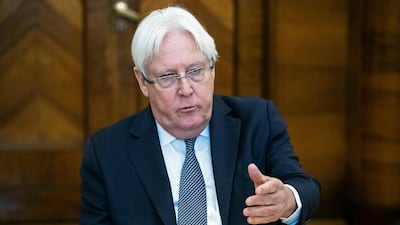The UN’s incoming aid chief, Martin Griffiths, on Tuesday said he was considering new ideas for a long-delayed mission to repair an oil tanker stranded off Yemen that could soon spill its load into the Red Sea.
Mr Griffiths, who will soon finish his three-year stint as UN peace envoy to Yemen and replace Mark Lowcock as the body's head of humanitarian affairs, said it was time to break a deadlock with the Houthi rebels who control access to the FSO Safer tanker.
The 45-year-old vessel, which has been stranded eight kilometres south-west of Ras Isa oil terminal since 2015, could rupture at any time.
Such an event could spill 1.1 million barrels of oil and cause a maritime disaster that would be four times worse than the 1989 Exxon Valdez spill off Alaska.
“In my next job, I’m going to have to take a more accountable role on this … we should also look at what are the options facing us, because this is an endless round of frustration,” Mr Griffiths said.
The Iran-backed Houthi rebels approved the UN mission in November, but later changed their minds.
The UN wants engineers to inspect the vessel, carry out light repairs and return later for a more comprehensive job.
But the Houthis want all repairs completed during the first visit, Mr Griffiths said.
This month, UN aid officials said the mission was running out of money because the date had been pushed back so many times.
“You'd be stupid if you didn't look over the horizon and say, ‘Is there a better way to do this?’” Mr Griffiths said.
Iranian officials have offered a “replacement tanker” to satisfy Houthi demands for fuel access, Mr Griffiths said.
“Commercial private sector efforts” offered a “different way” to fix the vessel, although he did not provide details as to how this might be done.
Any major oil spill would hurt tourism, fishing and desalination plants in Yemen, Saudi Arabia, Israel, Jordan, Egypt, Sudan, Eritrea and Djibouti, and impede a shipping lane through which about 10 per cent of global trade travels.
Analysts say the Houthis want the FSO Safer in place to profit from its cargo and future oil sales as well as to increase the risks for any seaborne assault by foreign forces.
Experts are divided on the best way to circumvent Houthi foot-dragging, repair the tanker and avert the looming environmental crisis.
Former UK foreign minister Sir Alan Duncan and Ian Ralby, chief executive of IR Consilium, a maritime security consultancy, are calling for a UN-authorised repair mission backed by western military.
But environmentalists say such a move is too risky.
Britain's UN ambassador Barbara Woodward on Tuesday said that the "perilous situation" off Yemen's coast was "no closer to being made safe".
"This issue is in the gift of the Houthis to deliver," Ms Woodward told the UN Security Council.
"We have heard that a worst-case scenario could put 670,000 lives at risk and take decades to clear.
"Rather than hiding behind endless bureaucratic hurdles, the Houthis must engage substantively to avoid a potential disaster."


